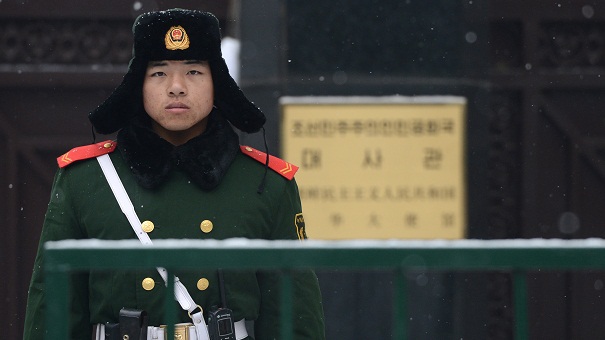Lora Saalman
{
"authors": [
"Lora Saalman"
],
"type": "legacyinthemedia",
"centerAffiliationAll": "dc",
"centers": [
"Carnegie Endowment for International Peace",
"Carnegie China"
],
"collections": [
"China’s Foreign Relations"
],
"englishNewsletterAll": "asia",
"nonEnglishNewsletterAll": "",
"primaryCenter": "Carnegie China",
"programAffiliation": "AP",
"programs": [
"Asia"
],
"projects": [],
"regions": [
"North America",
"United States",
"East Asia",
"China",
"North Korea"
],
"topics": [
"Security",
"Foreign Policy",
"Nuclear Policy",
"Arms Control"
]
}
Source: Getty
Why Beijing Stands by Pyongyang
Understanding Chinese priorities could help the United States to achieve specific outcomes in North Korea.
Source: Wall Street Journal
On the heels of North Korea's third nuclear test, speculation abounds that China has reached a new height of embarrassment and frustration over its neighbor's intransigence. The thinking goes that Beijing's new leadership will undertake a more active role on the North Korean nuclear issue.
However, this view underestimates Beijing's strong preference for multilateral negotiations and for the kind of stability its leaders see as necessary for economic growth. It also misses the depth of Beijing's aversion to the use of force or sanctions.
Lack of Sino-U.S. "mutual trust" is an oft-repeated term within China. But gaps in mutual interests, not mutual trust, drive miscommunication. China sees nuclear proliferation as less of a threat to its interests than does the U.S. In fact, within China nonproliferation is often framed as an excuse behind which the United States is able to engage in provocative acts, such as missile defense expansion, compromising China's security interests and containing its growth.Beijing is primarily concerned about stability and Washington's underlying motives, particularly with the advent of the latter's pivot or rebalancing toward the Asia Pacific. Thus China often responds more to the U.S. than to the case of proliferation itself.
When faced with the credible potential for attack or other destabilizing moves from Washington or its allies, Beijing is more likely to engage to thwart such an outcome. Chinese analyses in the lead-up to the first set of Six-Party Talks in August 2003 referred to U.S. actions and response to North Korea's nuclear program as precipitating a "battleground." At that time, a number of experts, such as Senior Colonel Xu Weidi at China's National Defense University, used the charged term "nuclear crisis" and made references to the potential for U.S. blockades.
After North Korea's 2006 nuclear test, a common refrain among Chinese analysts was that Beijing was waiting to see what Washington would do and then react accordingly. While there was consternation following the test, including use of the term "wantonly" to refer to North Korea's defiance, ultimately China's reaction was more about the U.S. than about North Korea. By the time of North Korea's 2009 test, "wantonly" was nowhere to be seen in official Chinese statements. Following the third nuclear test in 2013, Beijing's response has once again been to advocate restraint.
With each round of sanctions, Beijing has worked by most accounts, including in China, to soften and balance the wording of U.N. Security Council resolutions. While China agreed to a January resolution that condemned 2012's missile launch and upheld sanctions, North Korea's third nuclear test is likely to serve as fodder for Beijing's future arguments against the effectiveness of those sanctions. Chinese accounts emphasize how the hostility and rigidity of U.S. policies toward North Korea exacerbate proliferation. Domestic assessments routinely describe North Korea as having been "forced" down the nuclear path to seek "self-protection" since it is faced with "double standards" and threats of "nuclear coercion."
Such wording mirrors that used by China to describe the origins of its own nuclear deterrent. This is no coincidence. Chinese experts have a deep understanding of and empathy for the logic behind North Korea's nuclear and other weapons programs. Coming to terms with North Korea's provocative actions has been easier than doing the same with potential U.S. ones.
In addition to understanding North Korea's security rationale, Beijing has its own pronounced reservations over Washington's nonproliferation efforts, which it sees as ultimately intended to contain China. As a result, Beijing's pursuit of stability on the Korean peninsula does not mean that it seeks to resolve proliferation issues in an enduring way. Instead, China is more likely to continue doing whatever is necessary to keep the U.S. preoccupied and dissuade it from pursing more extreme responses that might harm Beijing's economic and political interests.
Without a better understanding of Chinese motivations, Sino-U.S. cooperation is unlikely to take the form or depth that Washington wants. When the U.S. makes a case for action in North Korea based on abstract nonproliferation principles, it is unlikely to gain lasting traction. The base assumption in China when evaluating U.S. policies is that Washington aims to maximize national interests—whether resource exploitation, absolute security or regime change.
In order to get what it wants, Washington should apply a similar logic and evaluation of interests to determine whether Beijing will profit or lose from a course of action in the Koreas. For example, Beijing is unlikely to sign on to sanctions that harm national growth or its companies' interests. But it will not necessarily block those sanctions that allow China to use U.S. isolation of a country to garner greater economic or political leverage.
Similarly, while China will not participate in military action to address proliferation, it may be compelled to participate in negotiations, sanctions, or even counter-proliferation to avert military or other extreme actions on the part of others that would destabilize its political or economic interests.
Understanding Chinese priorities could help the United States to achieve specific outcomes. Beijing's cooperation on measures such as the Proliferation Security Initiative to stem nuclear technology and material flows could be enhanced if Washington engaged China in information exchanges on U.S. ballistic missile defense. Doing so would address both a U.S. and Chinese core interest, and would shift the current pattern from crisis and reaction to something more predictable and cooperative.
This piece was originally published in the Wall Street Journal.
About the Author

Former Nonresident Associate, Nuclear Policy Program
Saalman was a nonresident associate in the Nuclear Policy Program at the Carnegie Endowment for International Peace. Her research focuses on China’s nuclear and strategic policies toward India, Russia, and arms control.
- Balancing Chinese Interests on North Korea and IranPaper
- How Big a Threat is North Korea’s Nuclear and Space Program?In The Media
Lora Saalman
Recent Work
Carnegie does not take institutional positions on public policy issues; the views represented herein are those of the author(s) and do not necessarily reflect the views of Carnegie, its staff, or its trustees.
More Work from Carnegie Endowment for International Peace
- Europe on Iran: Gone with the WindCommentary
Europe’s reaction to the war in Iran has been disunited and meek, a far cry from its previously leading role in diplomacy with Tehran. To avoid being condemned to the sidelines while escalation continues, Brussels needs to stand up for international law.
Pierre Vimont
- India Signs the Pax Silica—A Counter to Pax Sinica?Commentary
On the last day of the India AI Impact Summit, India signed Pax Silica, a U.S.-led declaration seemingly focused on semiconductors. While India’s accession to the same was not entirely unforeseen, becoming a signatory nation this quickly was not on the cards either.
Konark Bhandari
- What We Know About Drone Use in the Iran WarCommentary
Two experts discuss how drone technology is shaping yet another conflict and what the United States can learn from Ukraine.
Steve Feldstein, Dara Massicot
- Beijing Doesn’t Think Like Washington—and the Iran Conflict Shows WhyCommentary
Arguing that Chinese policy is hung on alliances—with imputations of obligation—misses the point.
Evan A. Feigenbaum
- Axis of Resistance or Suicide?Commentary
As Iran defends its interests in the region and its regime’s survival, it may push Hezbollah into the abyss.
Michael Young










